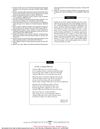 August 2016 in “Journal of Investigative Dermatology”
August 2016 in “Journal of Investigative Dermatology” Human hair follicles have a scent receptor that can influence hair growth.
 82 citations,
March 2012 in “Development”
82 citations,
March 2012 in “Development” Drosha and Dicer are essential for hair follicle health and preventing DNA damage in skin cells.
 8 citations,
April 2020 in “Journal of Ethnopharmacology”
8 citations,
April 2020 in “Journal of Ethnopharmacology” Herbs might help with hair loss, but more research is needed to confirm their safety and effectiveness.
 October 2023 in “Annales Academiae Medicae Silesiensis”
October 2023 in “Annales Academiae Medicae Silesiensis” Saw palmetto extracts might help treat male hair loss and need more research.
 3 citations,
January 1989 in “PubMed”
3 citations,
January 1989 in “PubMed” The review found that specific changes in scalp tissue can help diagnose different types of hair loss.
 January 2023 in “Медицинский вестник Северного Кавказа”
January 2023 in “Медицинский вестник Северного Кавказа” The patient with Hoffman's folliculitis got better with the right treatment, leading to hair regrowth.
 14 citations,
May 2020 in “Archiv für Tierzucht”
14 citations,
May 2020 in “Archiv für Tierzucht” Researchers identified genes that may affect hair growth in Cashmere goats.
 June 2022 in “bioRxiv (Cold Spring Harbor Laboratory)”
June 2022 in “bioRxiv (Cold Spring Harbor Laboratory)” ILC1-like cells can cause alopecia areata by attacking hair follicles.
January 2010 in “Chinese Journal of Aesthetic Medicine” EGCG promotes hair growth in mice.
 December 2002 in “Archives of Dermatology”
December 2002 in “Archives of Dermatology” The poem ends by asking for case reports on serious health issues like Telogen Effluvium.
 5 citations,
October 2008 in “Australasian Journal of Dermatology”
5 citations,
October 2008 in “Australasian Journal of Dermatology” Doctors need to understand statistics to properly evaluate clinical trials for patient care.
 20 citations,
September 2020 in “International journal of computer applications”
20 citations,
September 2020 in “International journal of computer applications” The Random Forest algorithm was the most accurate at diagnosing Polycystic Ovarian Syndrome.
 17 citations,
May 1987 in “Clinical and Experimental Dermatology”
17 citations,
May 1987 in “Clinical and Experimental Dermatology” A patient with Sézary syndrome showed improvement after treatment and the study suggested follicular mucinosis might indicate future lymphoma risk.
 16 citations,
January 2019 in “Neuropsychobiology”
16 citations,
January 2019 in “Neuropsychobiology” People with Lichen Planopilaris tend to be more depressed, have lower self-esteem, and a worse quality of life.
4 citations,
August 2018 in “Journal of cellular biochemistry” Acid inside cells speeds up aging and turns on aging signs in mice.
 2 citations,
July 2023 in “Obstetrics & Gynecology”
2 citations,
July 2023 in “Obstetrics & Gynecology” Imiquimod may be a better non-surgical treatment for cervical pre-cancer, but its effectiveness for vaginal pre-cancer is unclear, and it has some side effects.
February 2018 in “Chin J Clinicians(Electronic Edition)” Rash in SLE patients indicates more severe disease.
 October 2008 in “Australasian Journal of Dermatology”
October 2008 in “Australasian Journal of Dermatology” Medical practitioners need to understand basic statistics to properly evaluate clinical trials and avoid unethical designs.
3 citations,
February 2017 in “The American journal of dermatopathology/American journal of dermatopathology” Sarcoidosis can mimic other skin disorders, making diagnosis challenging.
2 citations,
January 2019 in “Skin appendage disorders” Early diagnosis and quick treatment improve life quality for FFA patients.
102 citations,
October 2010 in “Molecular Pharmaceutics” Copper-doxorubicin nanoparticles effectively treat tumors with less toxicity.
 3 citations,
July 2020 in “International Journal of Molecular Sciences”
3 citations,
July 2020 in “International Journal of Molecular Sciences” SCDSFs from zebrafish embryos are beneficial for treating cancer, regenerating tissues, and improving conditions like psoriasis and alopecia.

Patients with lichen planus should be tested for hepatitis C.
36 citations,
April 2005 in “British journal of dermatology/British journal of dermatology, Supplement” Radiation therapy is an effective treatment for severe scalp cellulitis with mild side effects and no long-term complications.
7 citations,
January 1991 in “Comparative biochemistry and physiology. A. Comparative physiology” A diet high in vitamin E improved blood health, skin, and fur in common marmosets.
 81 citations,
April 2009 in “Journal of Investigative Dermatology”
81 citations,
April 2009 in “Journal of Investigative Dermatology” Hair shedding is an active process that could be targeted to treat hair loss.
 4 citations,
July 2001 in “Personality and Individual Differences”
4 citations,
July 2001 in “Personality and Individual Differences” Men with moderate hair loss had the best spatial thinking, and long-term DHT might affect cognition.
 236 citations,
July 2001 in “Trends in Molecular Medicine”
236 citations,
July 2001 in “Trends in Molecular Medicine” Future hair loss treatments should aim to extend hair growth, reactivate resting follicles, reverse shrinkage, and possibly create new follicles, with gene therapy showing promise.
 63 citations,
March 2000 in “Annals of clinical psychiatry”
63 citations,
March 2000 in “Annals of clinical psychiatry” Some psychiatric medications can cause hair loss, but it usually grows back after adjusting the medication.
 39 citations,
September 2013 in “Journal of Cosmetic Dermatology”
39 citations,
September 2013 in “Journal of Cosmetic Dermatology” Herbs can potentially treat hair loss by inhibiting a key enzyme and promoting hair growth, and deficiencies in zinc, biotin, and iron are linked to hair loss.






















